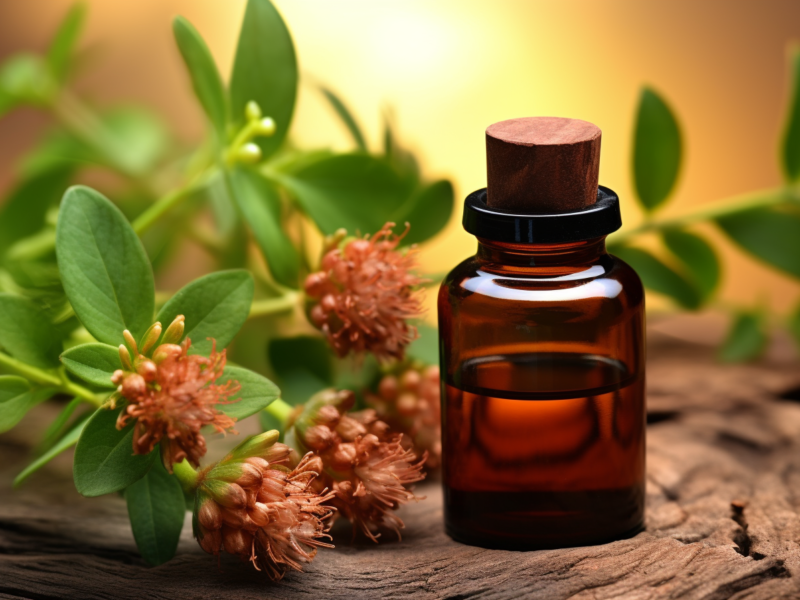The Health Benefits of Rhodiola Rosea Extract: Your Natural Weapon to Fight Fatigue
In our high-stress, always-on-the-go world, it’s never been more imperative to find natural, health-enhancing solutions to keep our bodies and minds in peak condition. One such solution is the root extract of Rhodiola Rosea, a powerful herb with potent health benefits, plentiful in regions like Siberia and the Scandinavian mountains. Rhodiola Rosea, also known as the golden root, is a versatile adaptogen to keep on your radar and in your self-care arsenal.
What is Rhodiola Rosea and its Health Benefits?
Understanding Rhodiola Rosea
Rhodiola Rosea L is a plant known for its adaptogenic properties, meaning it helps the body adapt to stress and restore normal physiological functioning. Historically used in traditional medicine in Eastern Europe and Asia, Rhodiola has been shown to have numerous health benefits, including immune support and stress relief.
Main Health Benefits of Rhodiola
The primary health benefits of Rhodiola Rosea extract revolve around its adaptogenic properties. Studies suggest that Rhodiola can alleviate the effects of stress, mitigate fatigue, and improve mental performance. Additionally, Rhodiola has also been shown to provide a boost to athletic performance, suggesting a wide range of benefits for many people.
Adaptogenic Properties of Rhodiola
As an adaptogen, Rhodiola Rosea helps the body resist different kinds of stressors, acting as a biological shield. This adaptogenic compound in Rhodiola can foster a sense of calm and combat fatigue, making it a beneficial addition to many dietary supplements.
How does Rhodiola Rosea L Extract work?
The Role of Salidroside Compound in Rhodiola
The primary active compounds in Rhodiola Rosea, rosavin, and salidroside, are largely been credited with the plant’s health benefits. These compounds influence several biological mechanisms, including hormone regulation, neurotransmitter balance, and immune response, which all contribute to Rhodiola’s effect on general health conditions.
The Effect of Rhodiola on General Health Conditions
Research suggests that Rhodiola may be useful in managing a wide range of health conditions. It has been shown to improve feelings of well-being, alleviate symptoms of depression, and provide antioxidant and anti-inflammatory effects. Moreover, Rhodiola may lower the risk of various diseases by strengthening the immune system.
Rhodiola’s Influence on Mental Performance
One of the remarkable benefits of Rhodiola Rosea is its influence on mental performance. Rhodiola has been shown to improve cognitive function, boost mood, and fight symptoms of depression, attributing it natural antidepressant properties.
What Dosage of Rhodiola Rosea should you Take?
Optimal Dose of Rhodiola for Different Health Conditions
While the optimal dosage of Rhodiola may vary based on individual factors, a general recommendation is to take 400 mg of Rhodiola daily. However, it’s essential to consult with a healthcare professional before starting any new supplements, including Rhodiola extracts and salidroside.

Interactions and Side Effects: Is Rhodiola Safe?
Generally, Rhodiola is safe, with little to no side effects reported in clinical studies.
Nonetheless, potential side effects may occur and could include dry mouth, dizziness, or elevated heart rate.
Individuals taking certain medications should consult a healthcare provider before adding Rhodiola to their regimen to avoid potential interactions.
Standardizing Rhodiola Extract Dosage
To ensure safe and effective use, the dosage of Rhodiola Rosea extract in supplements should be standardized. Most products offer standardized extracts containing 1-3% salidroside and 3-10% rosavins. Always choose high-quality Rhodiola products from reputable brands to ensure purity and efficacy.
The Anti-cancer Benefits of Rhodiola
The Potent Anti-cancer Effects of Rhodiola
Interestingly, studies demonstrate that Rhodiola Rosea has anti-cancer effects. It’s suggested that Rhodiola may inhibit cancer cells’ growth and proliferation, offering potential therapeutic benefits for cancer treatment.
How Rhodiola May Inhibit Cancer Cells
Anti-cancer properties of Rhodiola Rosea come from its components like salidroside. Laboratory studies reveal that this compound may trigger apoptosis, or programmed cell death, in cancer cells, suggesting potential therapeutic effects.
Rhodiola Rosea and Generalized Anxiety Disorder
Rhodiola Rosea may also be beneficial for individuals suffering from Generalized Anxiety Disorder (GAD). Research supports its use as a natural therapy for anxiety, helping to alleviate symptoms and improve overall quality of life.
Can Rhodiola Rosea improve your Exercise performance?
The Potential of Rhodiola in Enhancing Athletic Performance
Given its stress-reducing properties, Rhodiola may help improve exercise performance by boosting energy levels and resilience against workout-induced stress. Athletes and active individuals may benefit from adding Rhodiola supplements into their routines to enhance physical endurance and recovery.
Products that Contain Rhodiola for Active Individuals
A range of Rhodiola products, from tablets to teas, are available for those inclined to add this powerful adaptogen to their everyday routine. For athletes and physically active individuals, Rhodiola Rosea extracts in supplements may offer an extra edge. Since Rhodiola can help manage stress and promote recovery, it’s a beneficial inclusion in any active individual’s dietary regimen.
Rhodiola May Help with Stress and Anxiety During Exercise
People who perform intense workouts often suffer from stress and anxiety caused by physical exertion. Rhodiola Rosea offers a solution as it has been shown to help reduce the effects of stress, potentially benefitting mental well-being, and enhancing workout performance and recovery.

FAQS :
Q: How do you take Rhodiola for immune support?
A: Rhodiola Rosea, also known as the golden root or Arctic root, can be taken in capsule, tablet, liquid extract, or tea form for immune support. The recommended dosage typically ranges from 200 to 600 mg per day. However, it is essential to follow the instructions on the product label and talk to your doctor prior to starting any new supplements.
Q: Why is Rhodiola considered an adaptogenic herb?
A: Rhodiola is considered an adaptogenic herb because it has been found to increase the body’s general resilience to stress. Its bioactive compounds help the body adapt to physical and mental fatigue, improving mental focus and reducing symptoms of stress, anxiety, and depression.
Q: What are the anti-cancer effects of Rhodiola Rosea?
A: Some studies have shown that Rhodiola Rosea extracts and Salidroside have potential anti-cancer effects. They may inhibit the growth of breast cancer cells. However, more human studies and research are needed to establish the exact protective effects and understand the underlying mechanisms.
Q: Can you name some products that contain Rhodiola?
A: There are numerous products on the market that contain Rhodiola. These include various dietary supplements, energy drinks, and even some types of tea. Be sure to look for products that contain a standardized SHR-5 extract, which is the most studied form of Rhodiola root.
Q: What are the benefits of taking Rhodiola regularly?
A: Regular intake of Rhodiola may benefit both physical and mental health. It can help to boost resilience to stress, reduce symptoms of anxiety and stress, and combat mental fatigue. Additionally, Rhodiola may also enhance immune function and high blood pressure control. Yet, further research is needed to confirm these potential benefits.
Q: Where is Rhodiola found naturally?
A: Rhodiola Rosea, also known as the arctic root or golden root, grows naturally in the cold regions of Europe and Asia, especially the arctic areas. The Rhodiola root, which contains various bioactive compounds, has been used for centuries in traditional medicine.
Q: Can the intake of Rhodiola help in increasing mental capacity?
A: Yes, studies have shown that Rhodiola can help increase mental capacity. It helps reduce mental fatigue and improves concentration and cognitive function. However, further research is required to fully understand the extent of these effects.
Q: Are there any adverse effects of taking Rhodiola?
A: Rhodiola is generally considered safe with few adverse effects. However, some individuals may experience dry mouth, dizziness, or an upset stomach. It is always advisable to talk to your doctor before starting any new supplement regimen.
Q: Can Rhodiola contribute to controlling high blood pressure?
A: There is some evidence suggesting that Rhodiola may also have beneficial effects on high blood pressure. This could be due to its adaptogenic properties, helping the body adapt to stress, which is a known contributing factor to high blood pressure. More research is needed to confirm this potential benefit. Always talk to your doctor before using Rhodiola for this purpose.
Q: Does Rhodiola have an effect on symptoms of chronic stress?
A: Yes, Rhodiola is well-known for its ability to help the body cope with the effects of chronic stress. It reduces symptoms of stress and enhances the body’s resilience. However, it’s always best to consult with your healthcare provider before using Rhodiola or any supplement for stress management.




 Enhancing Exercise Recovery With Rhodiola Rosea
Enhancing Exercise Recovery With Rhodiola Rosea
